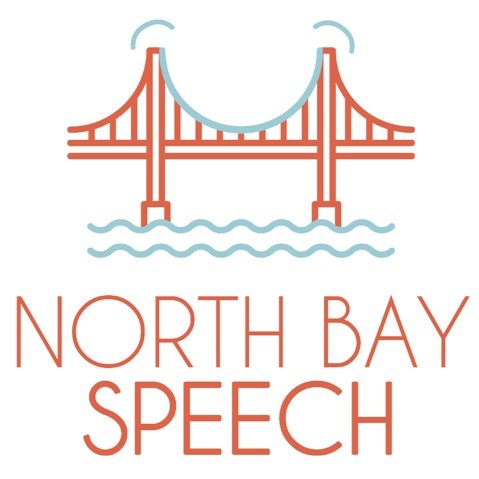SERVICES
At North Bay Speech, we offer evaluations and therapy for clients of all ages experiencing speech, swallowing, and orofacial myofunctional disorders in Marin County. Jill Cochrane is a highly-trained and specialized therapist who believes in collaborative care to deliver the best outcomes for her clients.
Orofacial Myofunctional THERAPY
EVALUATION OROFACIAL MYOFUNCTIONAL DISORDERS
An evaluation serves as the foundation for our recommendation and approach to therapy, allowing us to identify the root cause of the issues you or your child are experiencing. We use photos and videos, along with standardized procedures, to assess:
Dentition, soft tissue (buccal/ lip/tongue ties, tonsils), hard palate/size of the oral cavity, jaw development and structure, and posture
Stability, strength, and mobility of the jaw, cheeks, lips, soft palate, and tongue via myofunctional exercises
Tongue mobility to identify/rule our tongue ties
The oral phase of swallowing, chewing patterns, and breathing patterns
Speech sounds and connected speech when appropriate
Following the evaluation, we will share our findings and recommendations, which may also include referrals to multidisciplinary providers (dentists, orthodontists, periodontists, allergists, oral surgeons, ENT, pulmonologists, physical therapists, and occupational therapists) to address concerns outside the scope of practice of the speech pathologist.
OROFACIAL MYOFUNCTIONAL therapy
Orofacial myofunctional therapy is a collaborative effort between the speech therapist, client, and any other related professionals. We address each client’s specific needs through muscle-based work and exercises (think physical therapy for the mouth) focusing on:
Oral sensory awareness
Strength, stability and mobility, and lingual shaping/posturing
Correcting of maladaptive swallow patterns (tongue thrust)
Correcting oral resting postures that directly impact breathing, dentition, TMD
Improving soft palate function to aid speech, swallowing, and breathing (including nasal breathing that supports sleep)
Increased speech clarity
Once a client demonstrates adequate functioning of the jaw, lips, cheeks, and tongue, we teach and practice functional exercises to optimize breathing, chewing, swallowing (correcting tongue thrust), and speaking. Through repetition and daily practice, these functional exercises help clients develop lasting patterns and lifelong remediation.
Speech THERAPY FOR phonological disorders, articulation relating to tongue/lip tie, childhood apraxia of speech, AND dysarthria
A MULTI-FACETED APPROACH TO SPEECH THERAPY
Jill is highly skilled in treating a variety of speech sound disorders from mild to severe ranging from commonly mispronounced sounds like R, S, CH, SH, J to Childhood Apraxia Of Speech. Jill combines multiple evidence-based approaches to remediate speech sound disorders, rather than relying on a one size fits all methodology. Jill often incorporates PROMPT, Char Boshart's methodology, Oral Placement Therapy, Sara Rosenfeld-Johnson's Jaw Stability & Speech, SATPAC, Beckman, Kaufman Speech to Language Protocol, and Dynamic Temporal and Tactile Cueing to help her clients achieve age-appropriate speech clarity.
HOW SPEECH THERAPY CAN HELP
Through fast-paced repetition and interactive therapy, Jill helps her clients master speech sounds by applying the principles of motor learning. Along with daily home practice and parent involvement, speech therapy helps clients of all ages:
Improve motor planning skills for isolated speech sounds, phrases, sentences
Master age-appropriate speech sounds
Increase conversational speech clarity
Build confidence while speaking to others/groups
Oral phase dysphagia ~ swallowing
SWALLOWING evaluation
We will begin with an evaluation to understand the underlying cause for you or your child’s swallowing challenges. Our evaluations include:
Case history and client/parent interview
A full oral exam that differentially diagnoses structural issues from neurological disorders
Trials for exercises to strengthen oropharyngeal muscles
An assessment of swallow function during eating and drinking
Following the evaluation, we will share our findings and recommendations. If we suspect swallowing disfunction beyond the oral phase, we may refer out for an instrumental swallow evaluation to rule out any risks of silent aspiration. When therapy is recommended, we will collaborate to develop a treatment plan and goals.
swallowing therapy
Treatment for swallowing disorders will address strength, coordination, and sensory awareness of the jaw, lips, tongue, cheeks, and oropharyngeal muscles involved in eating and drinking. We work with clients to achieve:
Safe and enjoyable eating and drinking
Adequate chewing skills to break down the food for digestion and prevent choking and aspiration
Management of saliva/drooling
Coordination of breathing and swallowing
We will also incorporate new foods and address food and texture aversions to help our clients achieve the best possible outcomes.
Following the evaluation, we will share our findings and recommendations. If we suspect swallowing dysfunction beyond the oral phase, we may refer out for an instrumental swallow evaluation to rule out any risks of silent aspiration. When therapy is recommended, we will collaborate to develop a treatment plan and goals.



